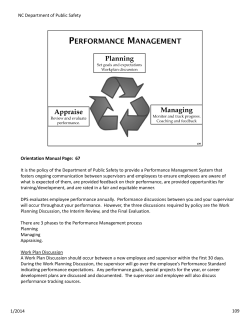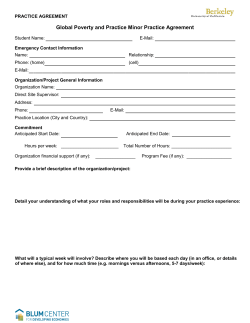
SciPro Idea Bank:
Page 111In Proceedings SciPro Idea Bank: Post conference work shop Matchmaking ideas, people and organizations to facilitate innovative theses Henrik Hansson, Jan Moberg, Ranil Peiris Department of Computer and Systems Sciences Stockholm University, Sweden ICTER International conference, 14th December 2012, Colombo, Sri Lanka Matching 1. Create, develop or find idea. Use the Idea bank: proposals from industry, public sector organisations and supervisors. 2. Student’s project idea is matched with supervisor based on key words and availability Project plan Peer-review 1. Upload manuscript/find manuscript for review, 2. Review according to prewritten checklists, 3 Author feedback on reviewer’s analysis Mid seminar Peer-review 1. Announce date, room, finished theses, 2. Select opponent, participants, communicate, 3.Distribute thesis to readers and supervisors, 4. Automatic anti-plagiarism check Individual supervision supported by: 1. Dynamic checklists, 2. Screening & commenting feedback, 3. Activity plan, 4. Auto-dated manuscripts. 5. Intersubjective quality ratings Final seminar Report grade R report Stable matching: Theory, evidence, and practical design Alvin Roth and Lloyd Shapley The Sveriges Riksbank Prize in Economic Sciences in Memory of Alfred Nobel 2012 Pairwise matching: how individuals can be paired up when they all have different views regarding who would be the best match. The main challenge involved designing a simple mechanism that would lead to a stable matching, where no couples would break up and form new matches which would make them better off. Pre-Process • 550 students need to develop their project ideas: – 400 bachelor ( mainly Swedish students) – 150 master (mainly international students) • Approximately 70 supervisors need to present themselves, their research topics and preferred mode of supervising. • Matching between students and supervisors Point of departure A good idea! Match: student and supervisor Creativity and methods Open minds New ideas/knowledge New products New services Closed minds Closed eyes Open eyes How to get a good idea? Supervisor introduction videos • Who • Research topics • 3-5 minuter Balance interests Phase 1: Research plan Instructions to student Write 1 ½ - 3 pages research plan. Structure the plan according to the following headings: • Title • Background • Aim and research questions • Methods and material • Expected results • Significance • Time and activity plan • References Checklist for your research plan: 1. Provide a preliminary title. This is the most abstracted way of presenting the study. What is it about? Maybe add a subtitle either explaining a catchy title more scientifically or specify the methods used? 1. Describe the context of the study. The background information needed to motivate the study. Use previous research and your own analysis. 2. What is the problem? Have you captured the actual problem? 3. Provide 3-7 preliminary core concepts. Self evaluation 4. What is the overall aim of the study? 5. What issues will the study not include (i.e. limitations)? Peer review 6. Which specific research questions will you study? Supervisor 7. a) What method(s) and theories will be used? b) why? 8. a) What kind of data will be collected? b) Why? 9. a) How is the sample selected? b) why? 10. What size is the sample? 11. Provide a time and activity plan. What will be completed and when?........ Questions? Problems related to theses and supervision • Negative economies of scale - time consuming (supervisor) • • • • • Great need of constant feedback (student) Lack of student motivation High drop-out rate Bachelor thesis, 3-year, 10 weeks Master thesis, 4-year, 20 weeks Low completion rate PhD thesis, + 4 year, 2 years Slow completion rates Aims • Increase theses quality • Increase completion of theses • Increase completions of theses within the time frame • Decrease thesis administration for all involved: students, supervisors, examiners and administrators Title, Abstract Chapter 1 Introduction Chapter 1.1 Background Chapter 1.2 Research question/ problem statement Chapter 2 Theoretical Level Chapter 3 Chapter 4 Empirical Level Chapter 5 Chapter 6 Theoretical Level Extended background Why? Reader curiosity Broad statement What? Domain-related scientific base Previous work/studies Aim/Goal/Purpose Task/Objective Literature review/state of the art Extended domain, theories, concepts Current technologies and procedures How? Method/Approach Result/Implementation Analysis/Discussion/Conclusions Concluding remarks/Future work References, Appendices Preparations First I'd like to say that the Scipro website is a great resource and help for students working on their thesis, good work! (student, 2012) Utbildningsinsatser: • • • • • • • • • • • • • • • • • • • • FAQ Supervisor FAQ Supervisor info Student info Thesissupport@dsv.su.se Supervisorsupport@dsv.su.se Filmer Bokade seminarier del 1 och del 2 HT Drop in hela veckan innan kursstart Drop in varje tisdag eftermiddag Uppsökande rumsservice – hands on Kompetensutvecklingsseminarium 1 gg/mån • Inspelade Meta-metodseminarium för studenter • Inspelade E-mail utskick Notice-board Hisstavlan Kick off: studenter Kick off DSV personal Öppen dörr Lunchmöten Supervisor introduction videos • Who • Research topics • 3-5 minuter Motivation videos PROJECT STATE PROGRESS INDICATOR Valbart schema - Kandidat helfart - Kandidat halvfart - Master helfart Activity Plan Empirisk forskningsansats Två forskningsansatser - Innehåller deadlines - Inlämningsfunktion/datum - Checklistor: To do I ett paket Handledaren måste aktivt välja Activity Plan för studenten Samt anpassa datum Utvecklingsbehov: Handledaren vill kunna spara sin specialbyggda Activity plan till nästa kursomgång Activity Plan Artefact Design Date 2012-03-19 2012-03-20 2012-03-23 Activity Meeting - Uppstartsmöte Meeting – Första handledarmötet Deadline – Lämna in projektplan Checklist 2012-04-04 Deadline – Lämna in bakgrund, syfte, metod och etiska ställningstaganden Deadline – Lämna in “Explikera problem” To do: Background, aim, methods and ethics Part I-III To do/Questions: Problem Explication Part I-IV Deadline – Lämna in “ Definiera mål och krav på artefakten” Deadline – Lämna in “ Utveckla artefakten” To do: Outline Artefact and Define Requirements To do: Design and Develop Artefact Part I-IV Deadline – Lämna in “ Pröva artefakten” Deadline – Lämna in “ Utvärdera artefakten” Deadline – Lämna in komplett examensarbete för granskning inför slutseminarium To do: Demonstrate Artefact To do: Evaluate Artefact To do: Analysis, discussion and conclusions Part I-IV Part I-V Part I-VI 2012-05-16 2012-05-25 2012-06-01 2012-06-01 Deadline – Lämna in för slutseminarium Deadline – Lämna in oppositionsrapport Meeting- Slutseminarium Thesis Part First meeting To do: Research plan/Project plan Part I-IV Part I-VI To do: Oral defence and opposition Alignment: Goals Higher education act Student Supervisor Reviewer Dep. Course objectives Evaluation critera Macro level Meso level Micro level SciPro Surveys Mobile Phone Integration • Android and Iphone apps Confident Confused Time saved (h=hour, min=minutes) with SciPro. Estimations per individual supervisor and for the department of computer and systems sciences (DSV) with approx 200 bachelor students writing in pairs, 150 master students and 80 supervisors yearly.) Feature Without SciPro With SciPro Time saved: Department (D) Supervisor (S) Matching: Idea Bank 0-40 h/Supervisor 0h D: 0-3200 h S: 0-40 h Matching: Supervisor bank 8 h/new supervisor 5 min D: 160 h if 20 missing supervisors Matching: Co-author 0-1 h/Student 0h D: 0 - 200 h S: 0 -1 h/Student Matching: Supervisor Equal Equal Easier Matching: Administration 480 h (selection) + 120 h (follow up) 120 h (follow up) D: 480 h Meta-management: Monitoring 1h 15 min D: 262 h S: 45 min Process: 1h Process: Peer-review system 4 h/Student 15 min/ Thesis 0h D: 262 h S: 45 min/student D: 1400 h S: 4 h/Student D: 500 h - 9000 h S: 2-36 h/Thesis Process: Dynamic checklists Self-evaluation Peer review Supervisor feedback 6 – 40 h/student 4h Process: integrated communication 1h 30 min D: 175 h S: 30 min/Student Process: Administration of mandatory presence/ assignments 1h 30 min D: 175 h S: 30 min/Student Process: Final seminar administration 1h 30 min Process: Anti-plagiarism check 1 h/Thesis 15 min/ Thesis Finalising: Grading and reporting 2 h/Thesis 15 min/ Thesis Meta-support: ? Meta-management: Documentation, statistics, evaluation 40 h 15 min/ Thesis 20 h D: 175 h S: 30 min/Student D: 188 h S: 45 min/Master T 22 min/Bachelor T D: 188 h S: 45 min/Master T 22 min/Bachelor T Quality . Increased completion rate D: 20 h Process: Mobile device support Sum individual supervisor saved hours. Min = one student, max = for example ten students, S: 10,5 - 432 h more student = more savings Sum DSV saved hours D: 3985 – 15885 h In total 200 bachelor theses and 150 master theses at DSV is worth 10,8 million SEK (1,2 million Euro/1,7 million US Dollar). New bottlenecks Project idea Matching Information Supervisors communication Reviewer Contact: E-mail: Henrik.Hansson@dsv.su.se Department URL: www.dsv.su.se
© Copyright 2025









